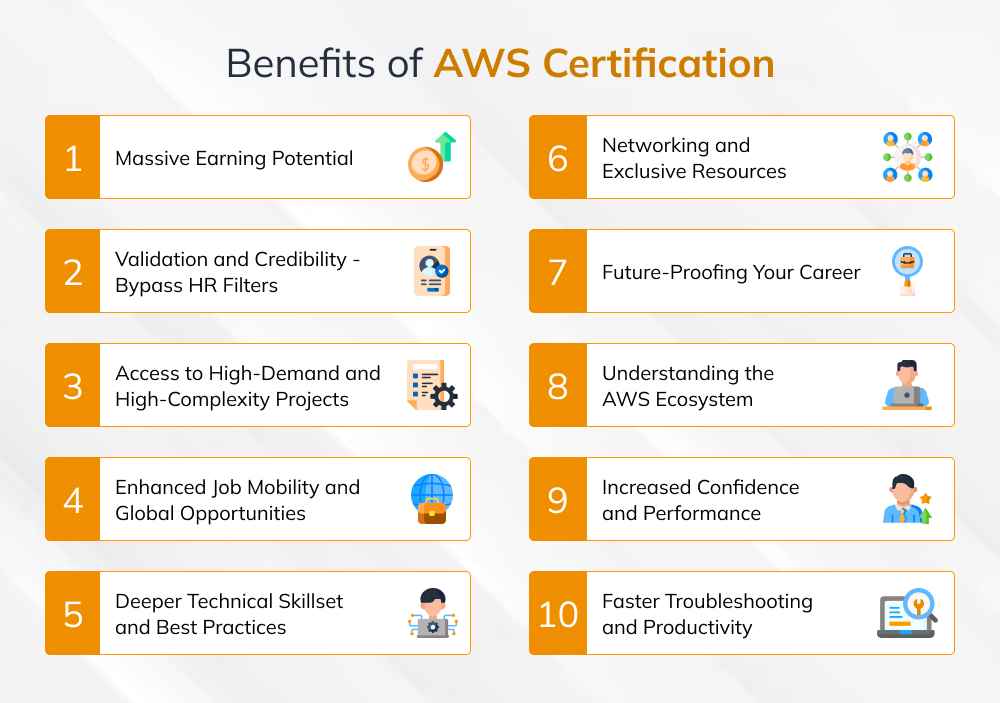
Cloud computing drives the backbone of today’s digital economy, and Amazon Web Services (AWS) remains the global leader, commanding roughly 31% of the worldwide cloud market. As enterprises across industries migrate to AWS for scalability, performance, and innovation, the demand for certified professionals continues to accelerate.
An AWS certification validates your technical expertise, builds professional credibility, and opens access to high-value roles in cloud architecture, DevOps, and security. It demonstrates that you can design and manage reliable, cost-efficient cloud solutions aligned with global best practices.
This article highlights the top 10 benefits of AWS certification, showing how it strengthens your career growth, enhances your earning potential, and positions you at the forefront of the cloud computing revolution.
What is AWS Certification?
AWS Certification is an official credential offered by Amazon Web Services that validates an individual’s expertise in cloud computing. It demonstrates proficiency in designing, deploying, and managing scalable systems on the AWS platform. The certification program includes multiple levels: Foundational, Associate, Professional, and Specialty, tailored to different technical roles. Earning an AWS certification helps professionals showcase their skills in key areas such as cloud architecture, security, and operations. Recognized globally, it serves as a benchmark for technical excellence and career advancement across industries that rely on AWS cloud infrastructure.
10 Key Benefits of AWS Certification
The value of AWS certification extends far beyond passing an exam. It’s a measurable investment that enhances your technical depth, market credibility, and career trajectory. From unlocking high-paying roles to gaining access to specialized global projects, certified professionals consistently outperform their peers in both salary and influence.
The following ten benefits explain how AWS certification transforms professional growth, strengthens organizational impact, and ensures long-term career relevance in an evolving cloud ecosystem.
1. Massive Earning Potential and Salary Spike
One of the most compelling advantages of AWS certification is its strong correlation with elevated compensation. According to multiple sources, AWS-certified professional’s salary is significantly higher than their non-certified peers. For example:
- AWS Certified Solutions Architect – Professional: reported around $151,000 on average in the U.S.
- Entry-level AWS Certified Cloud Practitioner: about US $85,866 per year in the U.S.
- Industry research indicates a salary uplift of 25–30 % for certified professionals compared to non-certified counterparts.
This premium reflects employer demand for individuals who have demonstrated proficiency in cloud architecture, operational management, and cost-effective design. Certification signals you are prepared for higher-impact roles both technically and commercially.
2. Validation and Credibility – Bypass HR Filters
AWS certification acts as a strong credibility signal. Recruiters and hiring managers increasingly rely on verifiable credentials to shortlist candidates efficiently, especially for specialized or senior-level roles. While certifications are not always the sole screening factor, a 2025 LinkedIn hiring trends analysis reveals that certifications are part of a growing multi-criteria evaluation process alongside skills assessments and portfolios. AWS certification provides independent, verifiable proof of your cloud expertise. Certified professionals receive a dynamic digital badge via Credly, a leading credential verification platform. These badges contain embedded metadata detailing certification type, issue date, and verification links, making them nearly impossible to falsify and easy for employers to confirm with one click.
Beyond recruitment, AWS credentials build client trust in consulting or freelance engagements. Many enterprises in finance, healthcare, and government prefer AWS-certified professionals to meet compliance or contractual standards. Holding an AWS certification does not only enhances your résumé but also positions you as a trusted expert capable of representing organizations in regulated, mission-critical projects.
3. Access to High-Demand and High-Complexity Projects
One of the most rewarding outcomes of earning an AWS certification is access to advanced and strategically important projects. Certified professionals are often prioritized for initiatives that demand deep architectural understanding, high availability design, and secure deployment models.
According to recent industry research, organizations strongly prefer certified cloud professionals for complex technical roles. A survey of hiring managers revealed that over 80% are more likely to hire candidates who possess cloud certifications, reflecting the critical role these credentials play in staffing cloud migration, modernization efforts, and large-scale digital transformation programs. These high-priority assignments include:
- Cloud migration and modernization of enterprise data centers to AWS infrastructure.
- MLOps and big data deployments using Amazon SageMaker, Redshift, and Glue.
- Security architecture design involving AWS WAF, IAM, GuardDuty, and KMS.
- Disaster recovery and high-availability frameworks across multiple regions.
Certified professionals also gain eligibility for AWS Partner Network (APN) projects, where consulting firms and technology vendors must maintain a specific number of AWS-certified staff to qualify for partner tiers and contracts. This certification requirement directly correlates with access to larger project opportunities, often translating to bigger budgets, global exposure, and strategic client engagements.
Government Case Study: Junta de Andalucía, SpainThe regional government for Andalusia (Junta de Andalucía) partnered with AWS Training and Certification Education Programs to modernize its IT curriculum and empower students for cloud-based careers. By deeply integrating AWS certification preparation and hands-on learning into its educational offerings, Junta de Andalucía increased student employability and ensured that graduates possessed in-demand, industry-recognized AWS certifications. This initiative not only modernized the local digital economy but also showcased how government-driven AWS training can prepare a skilled workforce for the future of public sector innovation. |
4. Enhanced Job Mobility and Global Opportunities
AWS certification is not confined by geography, it’s a globally recognized credential that opens doors in virtually every major market. With AWS operating across 38 geographic regions and 120 availability zones worldwide as of now, with plans for further expansion, certified professionals are qualified to work across North America, Europe, the Middle East, and the Asia-Pacific region with equal credibility.
According to a study commissioned by AWS and conducted by Enterprise Strategy Group, 69% of professionals reported higher earnings as a result of AWS Training, and 74% reported increased earnings from AWS Certification. Additionally, over 82% of AWS-trained learners reported increased job security, demonstrating the strong career mobility and international demand for these credentials. Research from Forrester further confirms that AWS-certified professionals in the Asia-Pacific and Latin America regions experience particularly high demand, with some organizations noting increased mobility opportunities for certified talent across borders.
Employers in countries such as the U.S., U.K., Germany, Singapore, and the U.A.E. consistently list AWS credentials as a top requirement for cloud-focused roles. This global demand extends beyond direct employment. Many independent consultants and contractors leverage AWS certification to bid for remote or offshore projects through global platforms like Toptal and Upwork, where AWS expertise is highly sought after by enterprises seeking cloud transformation support.
5. Deeper Technical Skillset and Best Practices
AWS certification goes beyond theoretical knowledge; it enforces structured, standards-based learning that deepens a professional’s technical foundation. Each certification exam is built on the AWS Well-Architected Framework, emphasizing five core pillars: security, reliability, performance efficiency, cost optimization, and operational excellence.
The exam preparation process itself compels professionals to explore advanced areas such as:
- Designing fault-tolerant and scalable architectures using Elastic Load Balancing, Auto Scaling, and multi-AZ deployments.
- Implementing governance and identity management through AWS IAM, CloudTrail, and Config.
- Optimizing storage and compute costs with services like S3 Intelligent-Tiering and EC2 Savings Plans.
- Strengthening security posture with encryption, key management, and compliance automation.
Employers value this standardized knowledge because it brings consistency and predictability to project outcomes. Certified staff apply AWS’s recommended patterns, which minimize rework and improve operational efficiency across teams.
In short, certification doesn’t just validate what you know, it transforms how you design and deliver. The process builds a mindset of continuous improvement, ensuring every solution aligns with global best practices for performance, security, and scalability.
Healthcare Case Study: One MedicalOne Medical, a membership-based primary care provider in the US, leverages AWS technologies and certified expertise to deliver patient-centered, high-quality care. By adopting AWS across its stack, One Medical streamlined administrative tasks, enabled secure, always-on virtual care, and improved operational efficiency for its clinical teams. The ability to consistently scale and innovate on AWS has allowed One Medical to simplify patient-provider connections, support rapid digital health expansion, and deliver a superior healthcare experience—backed by a team knowledgeable in AWS best practices. |
6. Networking and Exclusive Resources
AWS certification connects you to a global community of cloud professionals who continuously share best practices, innovations, and opportunities. Certified individuals gain access to exclusive networking channels, events, and learning benefits that extend well beyond the classroom.
One of the most notable advantages is access to the AWS re:Invent Certified Lounge, reserved exclusively for credentialed professionals. It provides opportunities to engage directly with AWS leaders, product teams, and other certified peers from across the world. Additionally, AWS frequently offers exam discounts, early beta access to new certifications, and invitation-only technical workshops, ensuring certified members stay at the forefront of evolving technologies.
The AWS Certified Global Community on platforms such as LinkedIn and the AWS Community Builder program further enables collaboration and mentorship. Professionals can exchange insights, discuss deployment strategies, and connect with potential employers or clients seeking verified experts.
7. Future-Proofing Your Career
Cloud computing is no longer an optional business strategy, it’s the operational core of modern enterprises. As organizations continue to migrate workloads and innovate through cloud-based services, the demand for AWS-skilled professionals continues to rise steadily.
According to Gartner’s Cloud Forecast 2025, global spending on public-cloud services is projected to reach US $723.4 billion, marking a 19 % year-over-year increase. AWS, holding approximately 31 % of this market, remains the largest cloud provider worldwide. This dominance guarantees that professionals certified on AWS will stay relevant across industries for years to come.
Certification also demonstrates a proactive commitment to lifelong learning, a quality highly valued by employers navigating digital transformation. As AWS frequently updates its services and adds new certifications (e.g., Cloud Operations Engineer Associate and Data Engineer Associate), certified individuals automatically stay up to date with the latest technologies and methodologies.
AWS certification serves as a career safeguard, ensuring your expertise evolves alongside industry trends. While tools and frameworks may change, the foundational principles of cloud design, cost optimization, and reliability learned through certification keep your skills future-ready and adaptable in an ever-changing technology landscape.
8. Understanding the AWS Ecosystem
AWS certification provides structured exposure to the entire AWS ecosystem, giving professionals a clear understanding of how over 200+ integrated services interact to build scalable, secure, and high-performing solutions.
Each certification track, Foundational, Associate, Professional, and Specialty, guides learners through progressively deeper layers of architectural knowledge. For example:
- Associate-level courses cover operational fundamentals such as EC2 compute, S3 storage, and networking basics.
- Professional and Specialty certifications expand into multi-tier architectures, data engineering, container orchestration (ECS/EKS), and automation with CloudFormation and CodePipeline.
This end-to-end view of AWS enables professionals to design solutions that are cost-efficient, well-governed, and aligned with the AWS Well-Architected Framework.
9. Increased Confidence and Performance
AWS certification strengthens not only technical expertise but also professional confidence, a key factor in leadership readiness and performance improvement. Certified professionals report higher assurance when making architectural decisions, leading teams, or optimizing cloud infrastructure.
AWS certification instills a structured decision-making approach. It trains professionals to systematically assess trade-offs among cost, performance, and security, skills that directly translate into higher-quality deliverables and more reliable systems. The result is a professional who doesn’t just follow instructions but leads with clarity, precision, and confidence.
Enterprise Case Study: IBM ConsultingIBM Consulting made a strategic investment in AWS certification to enhance its cloud expertise and better support global clients. Over 17 months, the company doubled its number of active AWS-certified professionals, reaching over 22,000 certifications, including foundational and specialty tracks. This rapid upskilling equipped technical and non-technical staff with a standardized understanding of AWS, resulting in higher client trust and improved project delivery capabilities. As a result, IBM Consulting could confidently advise clients, align offerings with security and ML trends, and expand its cloud transformation services globally. |
10. Faster Troubleshooting and Productivity
AWS certification not only enhances knowledge, but also directly improves technical agility and problem-solving efficiency in day-to-day operations. Certified professionals are trained to diagnose, isolate, and resolve issues across multiple AWS services faster than their non-certified peers.
Certified engineers are also more confident in using diagnostic tools such as CloudWatch, CloudTrail, and AWS Config, which significantly streamline fault detection and performance optimization. This proficiency not only benefits individual performance but enhances team efficiency, helping organizations minimize downtime and deliver consistent, high-quality service to clients.
Hence, AWS certification sharpens technical reflexes it equips professionals to act faster, troubleshoot smarter, and maintain stable, resilient cloud environments even under high-pressure situations.
Conclusion
AWS certification is now one of the most trusted qualifications in the tech world. It gives professionals a clear learning path, recognized credibility, and the confidence to manage complex cloud projects. People who earn this certification often see stronger technical growth, better job performance, and closer alignment with modern cloud standards.
If you’re starting out in cloud computing or aiming to step into a leadership position, AWS certification helps you prove your skills and build long-term career strength.
Take your next step in the cloud industry with Invensis Learning’s AWS DevOps Certification Training Course and move closer to becoming a confident, in-demand cloud professional.
Frequently Asked Questions:
1. What is the main benefit of AWS certification?
AWS certification strengthens your professional credibility and opens access to advanced cloud roles. It proves your ability to design, manage, and implement modern cloud solutions effectively.
2. Which AWS certification is best for beginners?
The best starting point is the AWS Certified Cloud Practitioner. It covers essential cloud principles, AWS core services, and shared responsibility concepts, perfect for newcomers to cloud computing.
3. How does AWS certification help in career growth?
It validates your skills globally, enhances your résumé visibility, and increases your chances of promotion or transition into high-responsibility technical and leadership positions.
4. Are AWS certifications recognized internationally?
Yes. AWS certifications are globally recognized by employers and technology partners, offering professionals the flexibility to work across industries and countries.
5. How long does it take to prepare for an AWS certification exam?
Preparation time varies by level. Foundational exams usually require a few weeks of study, while professional and specialty certifications may take several months of guided training and hands-on practice.















